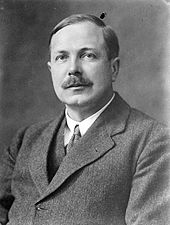Charles Galton Darwin
Sir Charles Galton Darwin (born December 19, 1887 in Cambridge , † December 31, 1962 ) was an English physicist . He was a son of George Howard Darwin and a grandson of Charles Darwin .
Darwin graduated from Trinity College , Cambridge, with a degree in mathematics in 1910 . He then worked at the University of Manchester under Niels Bohr and Ernest Rutherford with questions of atomic physics, which was developed at that time by Bohr and Rutherford in a leading position. From 1912 he dealt with X-ray diffraction under Henry Moseley and two of his works from 1914 are still considered classic today. During the First World War Darwin worked with the Royal Engineers on the problems of ballistics . From 1919 he was a lecturer and fellow at Christ College in Cambridge, where he worked with Ralph Howard Fowler on statistical mechanics (Darwin-Fowler method). After a year at Caltech , he became Tait Professor of Natural Philosophy at Edinburgh University in 1924 . In 1928 he was the first to treat the fine structure of the hydrogen atom with the newly developed relativistic quantum mechanics by Paul Dirac ( Darwin term ). In 1936 he received a Masters degree from Christ College. From 1938 he headed the National Physical Laboratory and was involved in the coordination of the US, British and Canadian efforts in the Allied atomic bomb project during World War II . In 1952 he wrote a pessimistic book about the population explosion on earth (The next million years) , in which he took up Malthus, propagated ideas of eugenics and propagated the breeding of a "master race". At the same time, however, he denies the possibility of such breeding in "The Next Million Years" p. 100: "Of all animals, man is most likely to undertake experiments, and there are always candidates - and there are only too many of them - who are themselves think fit to belong to the master race. But this quality is that of the wild beast, and it will always prevent man from taming himself. It will undermine the emergence of a master race by which the rest of humanity alone could be tamed thwart all circumstances. " He himself was the godson of the leading eugenicist Francis Galton .
He had been married to the mathematician Katharine Pember since 1925 and had four sons and a daughter with her:
- Cecily Darwin (* 1926), who dealt with X-ray diffraction.
- George Pember Darwin (1928-2001), who worked on the development of computers and was married from 1964 to Angela Huxley, whose great-grandfather was Darwin's bulldog Thomas Huxley .
- Henry Galton Darwin (1929–1992), who was in the British Foreign Office.
- Francis William Darwin (1932-2001), a zoologist at the University of London.
- Edward Leonard Darwin (born 1934), a civil engineer.
From 1922 he was a member (" Fellow ") of the Royal Society , which in 1935 awarded him the Royal Medal . Also in 1922 he became a Fellow of the American Physical Society . In 1924 he became a Fellow of the Royal Society of Edinburgh . In 1942 he received the title Knight Commander (KBE) of the Order of the British Empire . Since 1952 he was an elected member of the American Philosophical Society .
literature
- Sir Charles G. Darwin , in: Internationales Biographisches Archiv 08/1963 of February 11, 1963, in the Munzinger Archive ( beginning of the article freely available)
Web links
- Entry to Darwin; Sir; Charles Galton (1887-1962) in the Archives of the Royal Society , London
- Literature by and about Charles Galton Darwin in the catalog of the German National Library
Individual evidence
- ↑ Natural Philosophy is a term for theoretical physics at the time
- ^ Darwin The wave equation of the electron , Proc. Roy. Society Vol. 118, p. 654.
- ↑ English website on ideas of eugenics at Darwin ( Memento of the original from June 4, 2010 in the Internet Archive ) Info: The archive link was inserted automatically and has not yet been checked. Please check the original and archive link according to the instructions and then remove this notice.
- ^ Charles Galton Darwin, "The Next Million Years". An outlook on the future development of mankind. Translated from the English by Wilhelm G. Westphal. Friedrich Vieweg & Sohn, Braunschweig 1953
- ^ Fellows Directory. Biographical Index: Former RSE Fellows 1783–2002. Royal Society of Edinburgh, accessed October 19, 2019 .
- ^ Member History: Charles G. Darwin. American Philosophical Society, accessed July 6, 2018 .
| personal data | |
|---|---|
| SURNAME | Darwin, Charles Galton |
| BRIEF DESCRIPTION | English physicist |
| DATE OF BIRTH | December 19, 1887 |
| PLACE OF BIRTH | Cambridge |
| DATE OF DEATH | December 31, 1962 |
| Place of death | Cambridge |
